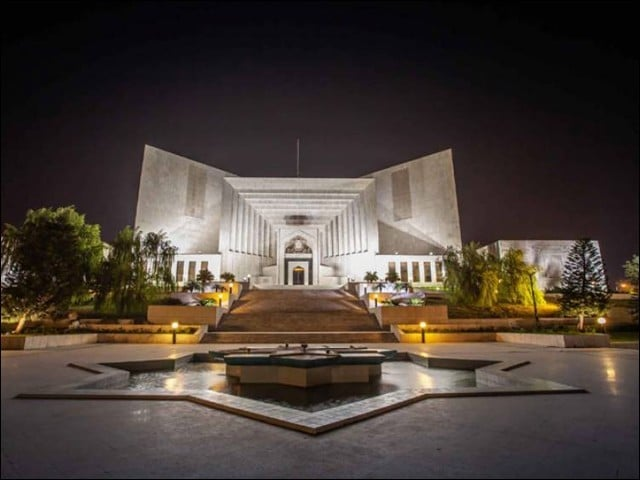
A full court bench of the Supreme Court will resume hearing petitions challenging the SC (Practice and Procedure) Act on Tuesday (today).
The bench headed by Chief Justice of Pakistan (CJP) Qazi Faez Isa and comprising all 15 judges of the Supreme Court will take up the pleas.
The highly anticipated case will be broadcast live on state television, as cameras from PTV have been installed inside Courtroom No.1. The hearing is scheduled to begin at 9:30 a.m.
The full court bench, led by CJP Isa, includes Justice Sardar Tariq Masood, Justice Ijazul Ahsan, Justice Syed Mansoor Ali Shah, Justice Munib Akhtar, Justice Yahya Afridi, Justice Aminuddin Khan, Justice Sayyed Mazahar Ali Akbar Naqvi, Justice Jamal Khan Mandokhel, Justice Muhammad Ali Mazhar, Justice Ayesha A. Malik, Justice Athar Minallah, Justice Syed Hasan Azhar Rizvi, Justice Shahid Waheed, and Justice Musarrat Hilali.'Undermines independence of judiciary'Meanwhile, ahead of the hearing, in a separate application filed in the case, Pakistan Tehreek-e-Insaf (PTI) has submitted additional documents and requested that they be made part of the case record.
The petition argues that the Constitution clearly defines the powers of the administration, legislature, and judiciary based on the principle of the trichotomy of exercise of powers.
It further asserts that the SC (Practice and Procedure) Act undermines independence of the judiciary, and was an attempt by the PDM government to interfere in the affairs of the judiciary by establishing a parallel system with the top court.
The plea emphasises that the constitution outlines the powers of the SC and the chief justice of Pakistan and legislation that goes against fundamental rights and the independence of the judiciary cannot be upheld.
The petition also contends that in the presence of the Supreme Court Rules, 1980, legislation regarding the Supreme Court cannot be enacted.
It is pertinent to note that in the last session, a 15-member larger bench led by Chief Justice Qazi Faez Isa heard the petitions against the law curtailing CJP’s powers.
During the session, the CJP made a point that the Act which was passed by parliament, does not take away the chief judge’s authority by giving it to a three-person committee.
In its short order, the 15-member full-court bench lifted the stay order over the implementation of the Act.


1732102112-0/BeFunky-collage-(77)1732102112-0-165x106.webp)




1732096230-0/BeFunk_§_]__-(12)1732096230-0.jpg)

1721801554-0/BeFunky-collage]-(10)1721801554-0-270x192.webp)

1732099821-0/BeFunk_§_]__-(14)1732099821-0.jpg)






COMMENTS
Comments are moderated and generally will be posted if they are on-topic and not abusive.
For more information, please see our Comments FAQ